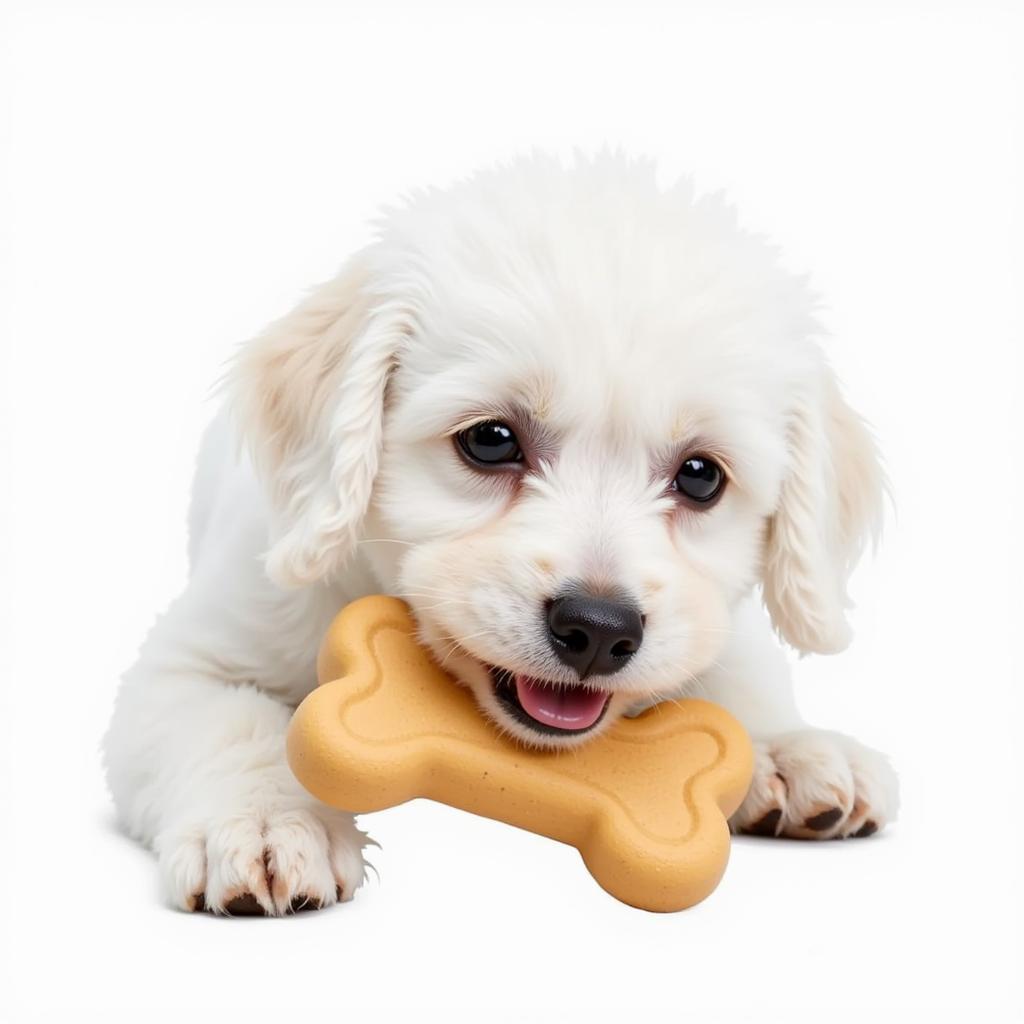Finding the Best Dog Food For Toy Poodles can feel overwhelming with countless options available. These pint-sized companions have unique nutritional needs due to their small stature and often energetic personalities. This comprehensive guide will explore those needs and provide you with everything you need to know to make an informed decision about your furry friend’s diet.
Understanding Your Toy Poodle’s Nutritional Needs
Toy poodles, despite their size, are active dogs that require a diet rich in protein, healthy fats, and essential vitamins and minerals to support their energy levels and overall health.
- Protein: High-quality protein sources such as chicken, fish, or lamb provide amino acids crucial for muscle development and maintenance.
- Healthy Fats: Omega-3 and omega-6 fatty acids contribute to a healthy coat and skin while also supporting cognitive function.
- Carbohydrates: While not a primary energy source, digestible carbohydrates like brown rice and sweet potatoes provide fiber and essential nutrients.
Factors to Consider When Choosing Food for Toy Poodles
Beyond the basic nutritional components, several other factors influence your toy poodle’s dietary needs:
- Age: Puppies, adults, and senior dogs have different metabolic rates and require varying calorie intakes and nutrient ratios.
- Activity Level: A more active poodle will need more calories than a less active one.
- Health Conditions: Food allergies, sensitivities, and specific health conditions may necessitate a special diet. Consult your veterinarian for recommendations.
Dry Food vs. Wet Food: Which is Best?
Deciding between dry and wet food depends largely on your preference and your poodle’s eating habits.
- Dry Food: More affordable, convenient for storage, and promotes dental health due to its crunchy texture.
- Wet Food: Higher in moisture content, often more palatable for picky eaters, and can be beneficial for dogs with urinary tract issues.
Ultimately, the best choice is what your dog enjoys and thrives on.
Ingredients to Look for in High-Quality Dog Food
Not all dog food is created equal. Look for these key features on the ingredient list:
- Real Meat as the First Ingredient: Chicken, fish, beef, or lamb should be listed first, indicating a higher protein content.
- Whole Grains and Vegetables: Provide essential fiber and nutrients.
- Avoid Artificial Additives: Artificial colors, flavors, and preservatives offer no nutritional value and may be harmful.
- Check for AAFCO Statement: The Association of American Feed Control Officials (AAFCO) statement ensures the food meets nutritional standards.
Common Toy Poodle Health Concerns and Dietary Solutions
Toy poodles are predisposed to certain health issues that can be influenced by diet:
- Dental Problems: Small mouths and crowded teeth make them prone to dental issues. Look for dental-specific kibble or provide dental chews.
- Hypoglycemia: Small breeds can experience low blood sugar. Frequent, small meals throughout the day can help regulate blood sugar levels.
- Tear Stains: While often cosmetic, tear stains can be minimized with a high-quality diet free from artificial colors and fillers.
 Toy poodle chewing on a dental treat to support oral health
Toy poodle chewing on a dental treat to support oral health
Feeding Your Toy Poodle: Tips for Success
- Follow Feeding Guidelines: Use the recommendations on the dog food packaging as a starting point and adjust portions based on your dog’s individual needs.
- Establish a Routine: Feed your poodle at consistent times each day to regulate digestion and prevent begging.
- Provide Fresh Water: Always ensure access to fresh, clean water for hydration.
Conclusion
Choosing the best dog food for your toy poodle is a crucial part of responsible pet ownership. By understanding their unique nutritional needs and paying attention to ingredient quality, you can help your beloved companion live a longer, healthier, and happier life. Remember to consult with your veterinarian to address any specific dietary concerns or questions you may have.
FAQ
1. How much food should I feed my toy poodle puppy?
Puppies have different dietary needs than adult dogs. Follow the feeding guide on your chosen puppy food and consult your veterinarian for personalized recommendations.
2. Can I give my toy poodle human food?
While some human foods are safe for dogs, many are toxic and should be avoided. It’s always best to err on the side of caution and stick to a balanced dog food diet.
3. What are the signs of food allergies in toy poodles?
Common food allergy symptoms include itchy skin, digestive upset, ear infections, and paw licking. If you suspect your poodle has a food allergy, consult your veterinarian.
4. How often should I change my toy poodle’s food?
Sudden diet changes can cause digestive upset. It’s best to gradually transition your poodle to a new food over several days.
5. My toy poodle is a picky eater. What can I do?
Try adding warm water or low-sodium broth to dry food to enhance the aroma and taste. You can also experiment with different protein sources or textures.
Need more assistance? Contact us at Phone Number: 02437655121, Email: [email protected]. Or visit us at: 3PGH+8R9, ĐT70A, thôn Trung, Bắc Từ Liêm, Hà Nội, Việt Nam. Our customer support team is available 24/7.